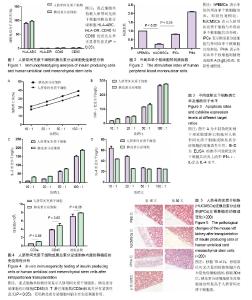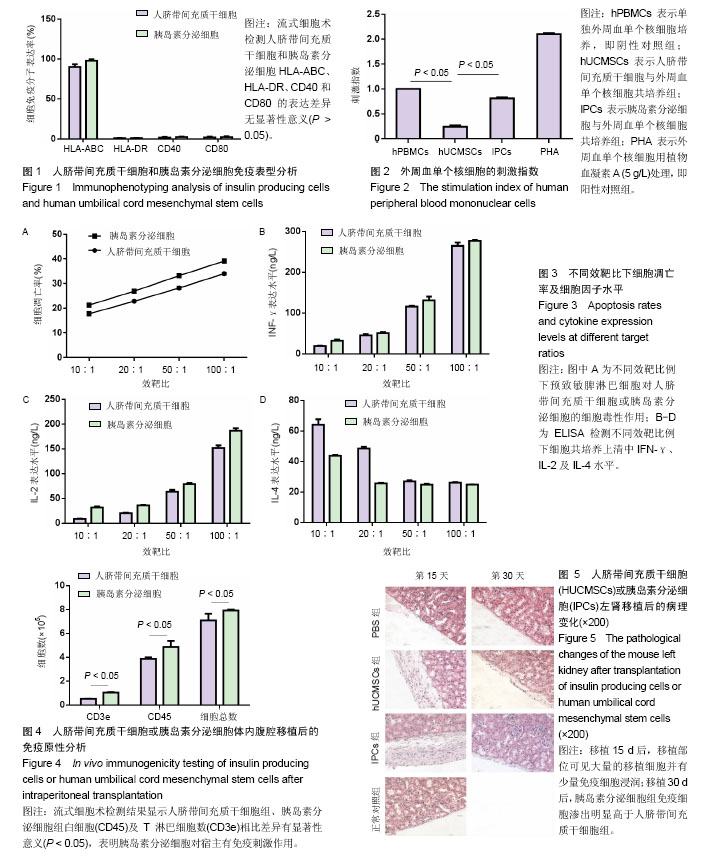| [1] Shapiro AM, Pokrywczynska M, Ricordi C. Clinical pancreatic islet transplantation. Nat Rev Endocrinol. 2017;13(5):268-277.[2] Ahearn AJ, Parekh JR, Posselt AM. Islet transplantation for Type 1 diabetes: where are we now. Expert Rev Clin Immunol. 2015;11(1):59-68.[3] Zhao K, Lou R, Huang F, et al. Immunomodulation effects of mesenchymal stromal cells on acute graft-versus-host disease after hematopoietic stem cell transplantation. Biol Blood Marrow Transplant. 2015;21(1):97-104.[4] Berglund AK, Fisher MB, Cameron KA, et al. Transforming Growth Factor-β2 Downregulates Major Histocompatibility Complex (MHC) I and MHC II Surface Expression on Equine Bone Marrow-Derived Mesenchymal Stem Cells Without Altering Other Phenotypic Cell Surface Markers. Front Vet Sci. 2017;4:84.[5] Tan K, Zheng K, Li D, et al. Impact of adipose tissue or umbilical cord derived mesenchymal stem cells on the immunogenicity of human cord blood derived endothelial progenitor cells. PLoS One. 2017;12(5):e0178624.[6] Maria AT, Maumus M, Le Quellec A, et al. Adipose-Derived Mesenchymal Stem Cells in Autoimmune Disorders: State of the Art and Perspectives for Systemic Sclerosis. Clin Rev Allergy Immunol. 2017;52(2):234-259.[7] Gu LH, Zhang TT, Li Y, et al. Immunogenicity of allogeneic mesenchymal stem cells transplanted via different routes in diabetic rats. Cell Mol Immunol. 2015;12(4):444-455. [8] Mohammadi Ayenehdeh J, Niknam B, Rasouli S, et al. Immunomodulatory and protective effects of adipose tissue-derived mesenchymal stem cells in an allograft islet composite transplantation for experimental autoimmune type 1 diabetes. Immunol Lett. 2017;188:21-31.[9] Lee HJ, Kang KS, Kang SY, et al. Immunologic properties of differentiated and undifferentiated mesenchymal stem cells derived from umbilical cord blood. J Vet Sci. 2016;17(3): 289-297.[10] Ciapetti G, Granchi D, Fotia C, et al. Effects of hypoxia on osteogenic differentiation of mesenchymal stromal cells used as a cell therapy for avascular necrosis of the femoral head. Cytotherapy. 2016;18(9):1087-1099.[11] Helal MA, Shaheen NE, Abu Zahra FA. Immunomodulatory capacity of the local mesenchymal stem cells transplantation after severe skeletal muscle injury in female rats. Immunopharmacol Immunotoxicol. 2016:1-9. [Epub ahead of print][12] Fu X, Yang H, Zhang H, et al. Improved osteogenesis and upregulated immunogenicity in human placenta-derived mesenchymal stem cells primed with osteogenic induction medium. Stem Cell Res Ther. 2016;7(1):138.[13] Yang R, Yu T, Zhou Y. Interplay between craniofacial stem cells and immune stimulus. Stem Cell Res Ther. 2017;8(1): 147.[14] Dhingra S, Li P, Huang XP, et al. Preserving prostaglandin E2 level prevents rejection of implanted allogeneic mesenchymal stem cells and restores postinfarction ventricular function. Circulation. 2013;128(11 Suppl 1):S69-78.[15] Chen T, Wang Y, Gu L, et al. Role of INGAP-pp in the differentiation of hUCMSCs into insulin producing cells. Xi Bao Yu Fen Zi Mian Yi Xue Za Zhi. 2013;29(2):141-145.[16] Foroutan T, Farhadi A, Abroun S, et al. Adipose Derived Stem Cells Affect miR-145 and p53 Expressions of Co-Cultured Hematopoietic Stem Cells. Cell J. 2018;19(4):654-659.[17] Sivanathan KN, Gronthos S, Grey ST, et al. Immunodepletion and Hypoxia Preconditioning of Mouse Compact Bone Cells as a Novel Protocol to Isolate Highly Immunosuppressive Mesenchymal Stem Cells. Stem Cells Dev. 2017;26(7): 512-527.[18] Lee S, Jeong S, Lee C, et al. Mesenchymal Stem Cells Derived from Human Exocrine Pancreas Spontaneously Express Pancreas Progenitor-Cell Markers in a Cell-Passage-Dependent Manner. Stem Cells Int. 2016; 2016:2142646.[19] Modiano JF, Lindborg BA, McElmurry RT, et al. Mesenchymal stromal cells inhibit murine syngeneic anti-tumor immune responses by attenuating inflammation and reorganizing the tumor microenvironment. Cancer Immunol Immunother. 2015; 64(11):1449-1460.[20] Hoogduijn MJ. Are mesenchymal stromal cells immune cells. Arthritis Res Ther. 2015;17:88.[21] Glenn JD, Whartenby KA. Mesenchymal stem cells: Emerging mechanisms of immunomodulation and therapy. World J Stem Cells. 2014;6(5):526-539.[22] Yang JF, Cao HC, Pan QL, et al. Mesenchymal stem cells from the human umbilical cord ameliorate fulminant hepatic failure and increase survival in mice. Hepatobiliary Pancreat Dis Int. 2015;14(2):186-193. [23] Yang D, Lin H, Liu G.Immunogenicity of human umbilical cord blood derived mesenchymal stem cells after osteogenic induction. Zhongguo Xiu Fu Chong Jian Wai Ke Za Zhi. 2014; 28(6):752-757.[24] Li Q, Zhang H, Yu L, et al. Down-regulation of Notch signaling pathway reverses the Th1/Th2 imbalance in tuberculosis patients. Int Immunopharmacol. 2018;54:24-32.[25] Qian LJ, Kang SM, Xie JL, et al. Early-life gut microbial colonization shapes Th1/Th2 balance in asthma model in BALB/c mice. BMC Microbiol. 2017;17(1):135.[26] Takahashi N, Saitoh T, Gotoh N, et al. The cytokine polymorphisms affecting Th1/Th2 increase the susceptibility to, and severity of, chronic ITP. BMC Immunol. 2017;18(1):26. |

